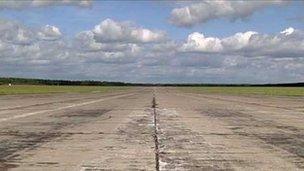Amnesty says EU 'failing' over CIA renditions
- Published

Poland is one of the countries accused of taking in terrorism suspects for interrogation
Amnesty International has accused the EU of failing to hold its members to account for their role in the detention of terrorism suspects by the CIA.
It calls for European governments to ensure justice for suspects who were interrogated under the programme known as extraordinary rendition.
Countries including Poland have been accused of hosting secret CIA prisons.
Many suspects are alleged to have been taken to other countries where they were tortured or disappeared.
Several European nations have been accused of co-operating by hosting secret CIA prisons or allowing CIA flights carrying the prisoners to use airports on their way to other countries.
In a report entitled Open Secret: Mounting Evidence of Europe's Complicity in Rendition and Secret Detention, published on Monday, Amnesty compiles what it says is the latest evidence of European countries' involvement in the CIA's programmes.
"The EU has utterly failed to hold member states accountable for the abuses they've committed," said Nicholas Berger, director of Amnesty International's European institutions office.
"These abuses occurred on European soil. We simply can't allow Europe to join the US in becoming an 'accountability-free' zone. The tide is slowly turning with some countries starting investigations, but much more needs to be done."
All the rendition victims interviewed by Amnesty International said they were tortured or otherwise ill-treated in custody, the report said.
A number of individuals were subjected to enforced disappearance, including in secret CIA detention, and the whereabouts of some remained unknown, it added.
Inquiries
Amnesty says - based on its own investigations and interviews with former detainees - that eight European countries were implicated in some way in the CIA's controversial programme.
It said secret prisons existed in Poland, Lithuania and Romania, while other countries, including Germany and Italy, facilitated the transfer of individuals.
It does acknowledge that some European countries are investigating their role.
A committee of the Lithuanian parliament has concluded that the CIA did set up prisons in the country.
Romania and Poland deny hosting detention facilities, but Polish prosecutors are investigating.
The CIA recently told the BBC that the programme of extraordinary rendition was over, but it did not discuss the location of detention facilities.
The UK has announced it will hold an inquiry into the actions of its intelligence services in relation to alleged complicity in the torture of detainees held abroad.
Amnesty said this move was hugely welcome, but that it was proving a long hard road to get European countries to face up to their full involvement, says the BBC's Gordon Corera.
"There is progress in a number of European countries towards accountability. The momentum must not be lost. The too often repeated mantra of 'need for state secrecy in order to protect national security' must not be used as a screen for impunity," Mr Berger said.
- Published6 October 2010
- Published6 October 2010
- Published15 July 2010